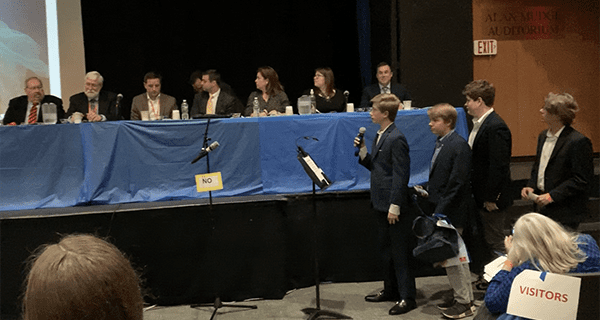By Amelia Tarallo
Hometown Weekly Staff
According to the Center for Biological Diversity, the average American family takes home around 1,500 single-use plastic bags each year. Though many attempt to find ways to reuse their plastic bags, most people never realize the environmental impact of using them in the first place. Each year, an estimated 100,000 marine animals are killed by plastic bags. But not all plastic bags go to the ocean. Some end up in landfill, where they will sit for 500 to 1,000 years until they biodegrade completely. The realization of these facts has led many towns to ban the use of plastic bags in stores and for other purposes.
One of the more recent towns to pass a bag ban is Dover, all thanks to a few very hardworking middle school students.
Nicholas Kube, Christian Casale, Nicco Ban, and Matthew Darin, all of the Dover-Sherborn Middle School, spent almost six months working to ban plastic bags in Dover. The four friends were inspired by bans in other towns, as well as seeing all of the plastic bags that could easily be found throughout Dover. Quick glances at the Charles River, in trees, and even around public buildings told the boys all they needed to know about Dover’s plastic bag problem.
Perhaps most inspiring was when one of the boys attended at W20 meeting. “Most of the people there had banned plastic bags in their town,” said Nicholas Kube, “and I wanted to be up there with them.”
In December, Nicholas Kube and his friends emailed the Dover selectmen for information on the process of banning plastic bags in Dover. They got their answer a month later in January, when they were told to pick up a petition paper. “We had to get enough signatures by the next day, so I ran around my neighborhood to get them,” said Kube. After successfully obtaining the signatures, the boys turned in the petition paper and went back to waiting.
After two to three weeks, the boys received their answer. They attended a Recycling Committee meeting and then presented the same information to the selectmen. The selectmen voted and supported the boys’ efforts.
The next step took the boys far out of their comfort zone and into the world of town laws and bylaws. In order to move further, the four boys had to write the bylaw for the bag ban themselves. This proved to be their biggest challenge. “We needed the correct terminology and the correct format,” recalled Christian Casale. One wrong word and the the entire bylaw could be rejected by one of the numerous groups that needed to approve it. Other people had tried to get plastic bags banned in Dover, only to be rejected at this stage in the process. The Dover Warrant Committee and a town lawyer worked with the boys and taught them how to write a bylaw, guiding them on what they could and could not include. The boys then had a full-fledged bylaw, ready to be voted on.
Following the completion of a bylaw, the boys were asked to attend a moderator’s meeting, where voting members decided whether or not the boys would be allowed to speak at the meeting.
With the go-ahead, the boys were invited to speak at the town meeting on May 6. Once again, the town had to vote whether or not the boys could present their bylaw and information about a proposed bag ban. If not, their parents would have to speak for them. Only around 15 people voted against them, while 176 voting attendees supported the boys speaking. The students were then given eight minutes to complete their presentation.
In their presentation, the boys discussed statistics about the effects of plastic bags in the environment, why it is impossible to recycle them, reasons why paper bags are better to use, and why reusable bags are the best option for shopping needs. They also provided information about other towns’ bag bans and how they had collected trash themselves. “We are fighting for our collective future and the future of the earth,” said Nicco Ban during his portion of the presentation.
Their message resonated with fellow Dover citizens. With 164 votes for yes, Article 25 passed, with only 32 votes for no. The boys were congratulated with applause and cheers from the audience.
After five months, the boys had managed to take on the use of plastic in everyday life. They had accomplished something most adults never will. “My favorite part of the project was getting it passed, because our hard work finally paid off,” noted Matthew Darin.
“It felt really good and relieved that our hard work paid off,” replied Christian Casale.
“Yeah, I think that was all of our favorite part,” said Nicholas Kube.
As for the boys’ tips for others trying to get bags banned in their towns? Keep going.
“Keep trying. There were some parts where we didn’t think it was going to get passed,” said one of the boys, “but we kept going.”

























